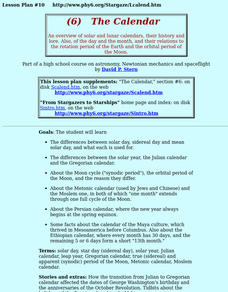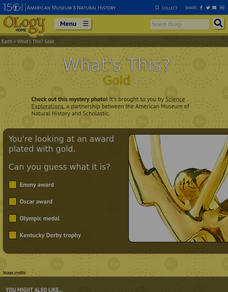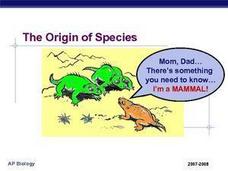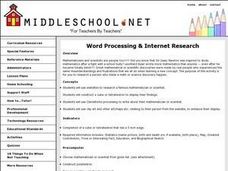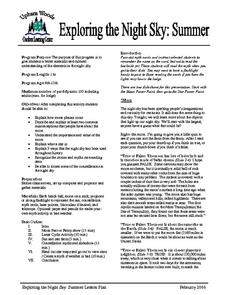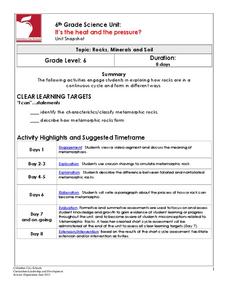Howard Hughes Medical Institute
EarthViewer
Can you imagine Washington DC and London as close neighbors occupying the same continent? Learners will be fascinated as they step back in time and discover the evolution of the earth's continents and oceans from 4.5 billion...
Howard Hughes Medical Institute
The Day the Mesozoic Died
While this is not the traditional, step-by-step lesson plan, it is chock-full of material that you can easily incorporate into your earth history unit. Its main purpose is to serve as a guide to using a three-part film, The Day the...
Curated OER
Dark Days on the Prairie
Young scholars explore U.S. geography by researching agriculture. In this dust bowl lesson, students complete a cause and effect worksheet based upon the dust bowls that covered a large portion of Oklahoma and Texas in the early 1900's....
Curated OER
Discovering Elements
A periodic table of elements displays the elements in groups ordered by when they were discovered. Click-by-click, new elements are added, resulting in an almost up-to-date chart. In order to reinforce the idea that symbols are used in...
Curated OER
Plate Tectonics Day 3 Sea Floor Spreading: Evidence for Continental Drift
Learners are introduced to Sea Floor Spreading and how it provides evidence for Hess's and Deitz's theory of Continental Drift. They use paleomagnetic data to calculate the rate of Sea Floor Spreading.
Curated OER
Native American Three Sisters Gardens
Young scholars investigate companion planting. In this communtiy gardening lesson students explore the tradition of the Native American Three Sisters gardening approach. Young scholars act as botanists, anthropologists,...
Curated OER
The Calendar
Learners engage in an overview of solar and lunar calendars, their history and lore. Also, of the day and the month, and their relations to the rotation period of the Earth and the orbital period of the Moon.
American Museum of Natural History
What's This? Gold
Cell phones are likely made of gold—at least part of them! An interesting lesson explains the conventional and not-so-conventional uses of the popular element gold. From the Inca empire to modern-day technology, learners discover gold...
Curated OER
Origin of The Species
After viewing information about different types of isolation, students will see that reproduction among a group will cause the frequency of a specific trait to increase. The history of prominent scientists such as Charles Darwin are and...
Teach Engineering
The Amazing Red Planet
Introduce your class to Mars with a resource that provides information about its size, location, length of day, length of year, number of moons, and average temperature. Also includes is information about the lans for past...
Curated OER
Mayan Farming Practices
The introduction of this lesson requires reading a from The Maya by Jaqueline Dembar Greene. Learners sketch a Mayan during the reading. Teaching strategies include direct instruction, grouping the students for discussions, reasearch,...
Curated OER
Happy Birthday Mathematicians and Me
Students choose a mathematician or scientist born on the same day as the student and research them. They create a cube or tetrahedron and place required information on the sides (such as birth year, death yr., greatest contribution to...
Curated OER
Watercolor Rainbows
Who doesn't love a rainbow? Little ones adore them, so why not make rainbows the subject of your next art project. Your class can use watercolor to paint rainbows. As they do, have them identify the colors in the rainbow, talk about how...
Curated OER
Exploring the Night Sky: Summer
Learners explain how moon phases occur. They describe and explain at least two common misconceptions that people have about the moon. Students explain what a star is. They explain 3 ways that the night sky has been used throughout history.
Curated OER
Why Do Some Birds Have Two Homes When We Have One?
Sixth graders study migratory birds in the temperate forest and the tropical rainforest. In this migratory birds lesson, 6th graders participate in different activities that explain patterns of migration, research patterns of...
Curated OER
Prehistoric Discoveries
Students agree or disagree with several statements about ancient animals, then read a news article about recent prehistoric discoveries. For this earth science and current events lesson, the teacher introduces the article with a...
Curated OER
A Life to Remember
Students test and discuss their ability to remember events in their recent and past history and reflect on cases of dissociative fugue and amnesia. They graph and analyze data to look for patterns in the ability to recall a list of...
Columbus City Schools
It's the Heat and the Pressure?
Ready for a change? Give a comprehensive collection of metamorphic materials a try! With the assortment of printables and lab activities, you won't be under pressure to keep things lively. The unit culminates by having...
Curated OER
Comparing the Satellite and Broadcast Radio Landscapes
Students research the development of satellite technology over the last 50 years students explain how the enactment of the Telecommunications Act of 1996 changed the rules for corporate ownership of multiple media outlets.
Curated OER
Good Timing
Students investigate time, how people measure it, and how it influences our lives. They complete an online Webquest, analyze various calendars, answer discussion questions, and identify references to time in a newspaper article.
Curated OER
Exploring the Night Sky: Fall/Winter
Students explain how moon phases occur. They explain three ways that the night sky has been used through history. Students locate some of the constellations in the night sky. They discuss stories and myths surrounding stars.
Curated OER
Art and Anatomy: The Vitruvian Teen
Students are introduced to the history of showing the human anatomy. In groups, they measure their height and arm spans to create a graph and determine if their measurements support Vitruvius' work. Individually, they make their own...
Curated OER
Why Do Atoms Combine?
In this subatomic particle worksheet, students will read the important discoveries throughout history of the neutrino. Based on this information, students will complete 4 short answer questions.
Curated OER
Back to the Farm
Students complete a family tree. In this farming and ranching lesson, students define the term genealogy, learn how to create a family tree, and fill in a family tree with the help of their parents making sure to note if any of...






